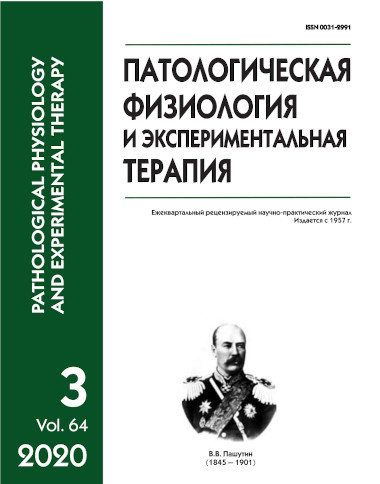Молекулярные и клеточные механизмы резистентности глиобластомы к ингибиторам фактора роста эндотелия сосудов
DOI:
https://doi.org/10.25557/0031-2991.2020.03.137-145Ключевые слова:
глиобластома, ангиогенез, ингибиторы фактора роста эндотелия сосудов, резистентность, VEGFнезависимый ангиогенез, клетки костного мозга, перициты, сосудистая коопция, периваскулярная инвазия, аутофагияАннотация
Представлен обзор современных литературных источников, посвященных изучению молекулярных и клеточных механизмов резистентности глиобластомы к антиангиогенным лекарственным средствам. Ангиогенез представляет собой важнейший патофизиологический механизм роста и прогрессирования глиобластомы за счет активного развития микрососудистой сети. Ускоренное развитие микрососудистой сети в глиобластоме происходит благодаря синтезу опухолевыми клетками большого количества фактора роста эндотелия сосудов (Vascular Endothelial Gowth Factor, VEGF). Среди основных молекулярных и клеточных механизмов лекарственной устойчивости глиобластомы к анти-VEGF агентам принято относить VEGF-независимые пути ангиогенеза, активность клеток костного мозга и перицитов, а также сосудистую кооперацию, периваскулярную инвазию и феномен аутофагии. Авторами изложены современные данные о рациональном и наиболее эффективном использовании анти-VEGF лекарственных средств у пациентов с глиомами высокой степени злокачественности. Обозначены актуальные, остающиеся нерешенными вопросы, что обусловливает необходимость проведения дальнейших экспериментальных и клинических исследований, посвященных изучению механизмов лекарственной устойчивости глиобластомы к анти-VEGF препаратам.Загрузки
Опубликован
21-08-2020
Выпуск
Раздел
Обзоры
Как цитировать
[1]
2020. Молекулярные и клеточные механизмы резистентности глиобластомы к ингибиторам фактора роста эндотелия сосудов. Патологическая физиология и экспериментальная терапия. 64, 3 (Aug. 2020), 137–145. DOI:https://doi.org/10.25557/0031-2991.2020.03.137-145.










